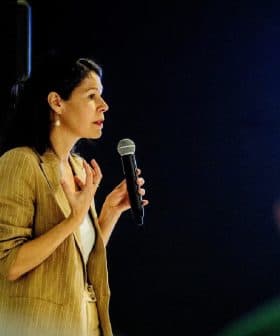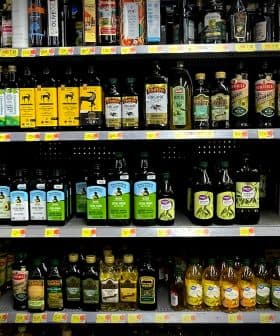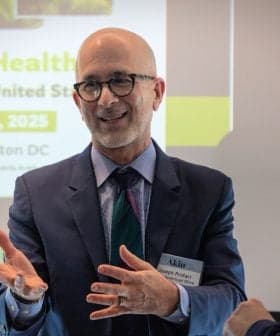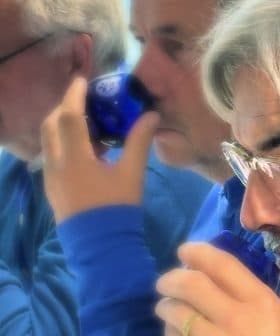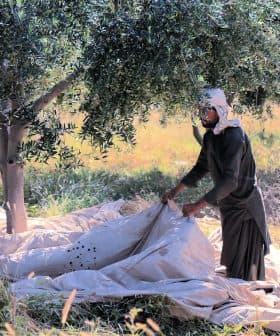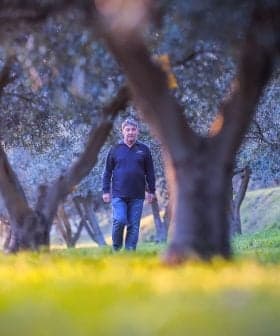Simplifying Science is the Goal of New U.S. Marketing Campaign
At a California conference, the International Olive Council laid out its plan to translate the wealth of proven health benefits to growing consumer consumption.
 International Olive Council deputy director Jaime Lillo
International Olive Council deputy director Jaime LilloThe International Conference on Olive Oil and Prevention of Chronic Disease aimed to bridge the gap between scientific findings and consumer knowledge by showcasing the latest studies on olive oil’s health benefits, leading to the launch of the Olive Oil Promise campaign in the U.S. The campaign seeks to educate the American public about the proven health benefits of olive oil and increase consumption by demystifying terminology and promoting the product as a health, lifestyle, and culinary product.
If the overt goal of the International Conference on Olive Oil and Prevention of Chronic Disease was to present scientific findings, the underlying goal was to bridge worlds with words.
The California conference showcased the work of European and American academics, who reported their latest studies concerning olive oil’s effects on cardiovascular health, cancer, diabetes, stroke, Alzheimer’s, and other neurological and chronic diseases.
It was the first International Olive Council scientific conference in the U.S. since 2001 and the springboard for a three-year marketing campaign titled the Olive Oil Promise.
“Our purpose today is to bring all of the olive oil family to California, to the heart of American olive oil, to look to the future and send a strong message about the olive oil promise,” said Jaime Lillo, deputy executive director of the IOC.
To these ends, the scientists will synthesize their findings into a report that will inform a consumer-facing promotional campaign to educate the American public about the proven health benefits of olive oil.
“This is how we can fix the gap between academics and consumers,” said Lillo. “We believe there’s a lot of room for improvement when it comes to consumer knowledge of health benefits.”
According to the IOC, consumers tell market researchers they buy olive oil for health reasons, but can’t finish the sentence to answer “why.” Among the general public, there’s widespread unawareness of the data-based, scientifically-proven benefits.
When the Olive Oil Promise campaign launches in New York in June, the IOC says it will mark the beginning of a concerted effort to increase U.S. consumption by demystifying the health benefits and clearly defining the terminology such as extra virgin, virgin, refined and cold pressed that contribute to the confusion.
The goal of the Olive Oil Promise campaign, according to the IOC, is to deepen consumers’ appreciation of olive oil by communicating its benefits as a health, lifestyle, and culinary product.
© Olive Oil Times | Data source: International Olive Council
It’s a question of packaging science for laypeople, translating the perplexing polysyllabism of polyphenols into plain phrases that make sense and sales.
The Olive Oil Promise campaign comes seven years after another IOC initiative in the U.S. market that left more than a few promises of its own unfulfilled. The 2011 “Add Some Life” campaign kicked off with a Lincoln Center cocktail reception for food bloggers during New York’s Fashion Week. In 2013, the IOC deemed the 18-month, $1.7‑million promotion a “success” although U.S. consumption barely budged over the course of the campaign and few in the industry had recalled seeing any promotional activities arise from it.
The IOC’s executive director at the time, Louis Barjol, said the impact would depend on the “synergy” that would develop if producers leveraged the Add Some Life campaign with their own initiatives. That didn’t happen and the campaign’s website and social profiles were inactive.
Much like the 2011 campaign, the approach of the new promotion will be to target ‘influencers’ with “special events and regular communications,” said Wendy Lane Stevens a public relations consultant who works with the IOC. “We really are looking forward to building a database of people who are interested in olive oil, health and the industry,” she said, adding that the channels will include a website, newsletter, LinkedIn page and an “influencer database.” The IOC has not publically specified the budget for the new campaign.
The United States is not a member of the International Olive Council, but it is the world’s largest olive oil importer and developing the American market has long been a priority for the Madrid-based intergovernmental organization.
The UC Davis Olive Center hosted the scientific conference just as it celebrated its 10th anniversary.
Dan Flynn, founder and executive director of the UC Davis Olive Center, got the last word at the conference. Flynn left participants with the Hippocratic parting advice to “let food be thy medicine and medicine be thy food.”
A video of the conference can be viewed here.


